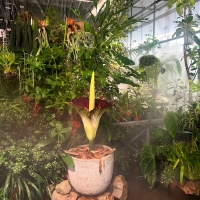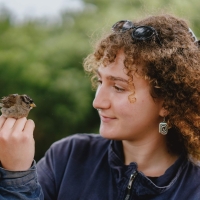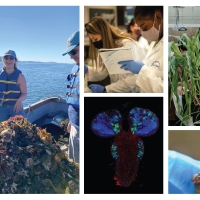Students help put scientists from diverse backgrounds in the spotlight

When she was a fourth-year Biology student at San Francisco State University, Daniela Sanchez knew she wanted to be a research scientist but didn’t know how to take the first step. Then she received an unexpected invitation to participate in a new Biology service-learning course. She wasn’t entirely sure what she was signing up for, but she took a shot.
“My identity as a scientist really switched completely there [in that class]…,” says Sanchez, now a master’s student in Ecology, Evolution and Conservation Biology at San Francisco State. “If it wasn’t for that, I am absolutely convinced that I wouldn’t be here.”
Sanchez was part of a cohort of students invited to participate in Learners Engaged in Advocating for Diversity in Science (LEADS). In this four-unit class, pairs of students were partnered with Biology faculty members to develop Scientist Spotlights, curricular materials that incorporate the stories of scientists from diverse backgrounds. The results of the class are the focus of a new paper in CBE—Life Sciences Education.
Although previous studies demonstrate the impact of faculty-written spotlights, the goal of LEADS was to allow students to choose and write the spotlights for their peers, says Maurina Aranda, who led the course while a postdoctoral fellow at SF State. The paper — authored by both University faculty and undergraduates — shows that not only were student-written spotlights effective in classrooms but that the student writers themselves experienced a positive shift in their perspectives about science and scientists.
For example, one of Sanchez’s spotlights was about Derek Braun, a molecular biology professor at Gallaudet University, a private school for students who are deaf and hard of hearing. Braun, who is deaf, is an active researcher and avid mentor who communicates research through sign language. His story helps Sanchez remember that scientists — including her own professors and mentors — have unique experiences and these differences can often be a researcher’s biggest strength.
That kind of realization was one of the goals with the spotlights, says Aranda, who is now an assistant professor of Biological Sciences at Southern Illinois University Edwardsville. Both the spotlights and the LEADS class itself also helped students find individuals whose journeys mirror their own. “I think that that really helps students think about reasons to persevere…,” she said. “It also just really builds your own identity as a scientist.”
Sanchez echoes this sentiment, noting that she often reflects on that semester. “I don’t think I would be as aware of how my experience has affected the way I have developed [and] in the way I present myself in these [STEM] spaces,” she said.
This is an important part of this project, explained Associate Professor and Associate Chair of Biology Blake Riggs, because a person’s identity is on full display the moment they enter a room. Riggs, who co-instructed the course, stresses that toxic training environments — even if they are seemingly benign — can derail students. It is important to have efforts like LEADS and Scientist Spotlights to counteract these pressures.
“We were in somewhat of a crisis in science and, I don’t think it gets talked about like this, but we have a lot of problems…,” he said. “And we’re not tapping into our greatest resource, which is us. Scientific discoveries come from diversity.”
LEADS and another class called Peer Assistants for Learning Science are supported by the Howard Hughes Medical Institute Inclusive Excellence Initiative. Riggs, who is program director of the SF State program, looks forward to having another LEADS course, though this time virtually. Long term, he hopes Scientist Spotlights can be implemented in departments outside of Biology.
As for Sanchez? It’s been three years since she was in LEADS and she now has her eyes on pursuing a Ph.D.
“I want my future [mentor] to first of all look at me as a person and then look at me as a scientist, because I am both,” she said. “But I think I cannot be a scientist if I am not recognized as my own person.”
https://news.sfsu.edu/news-story/students-help-put-scientists-diverse-backgrounds-spotlight



